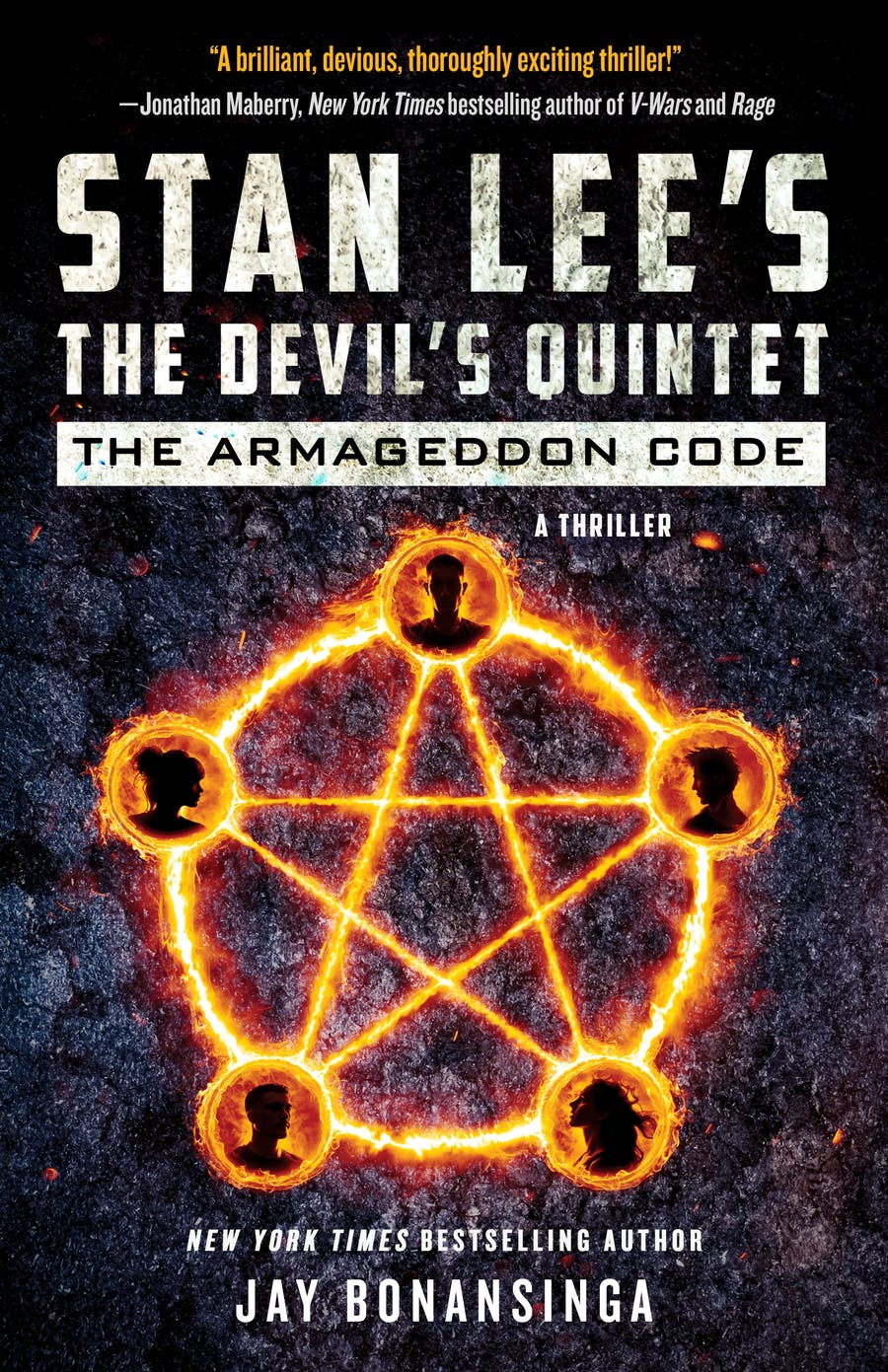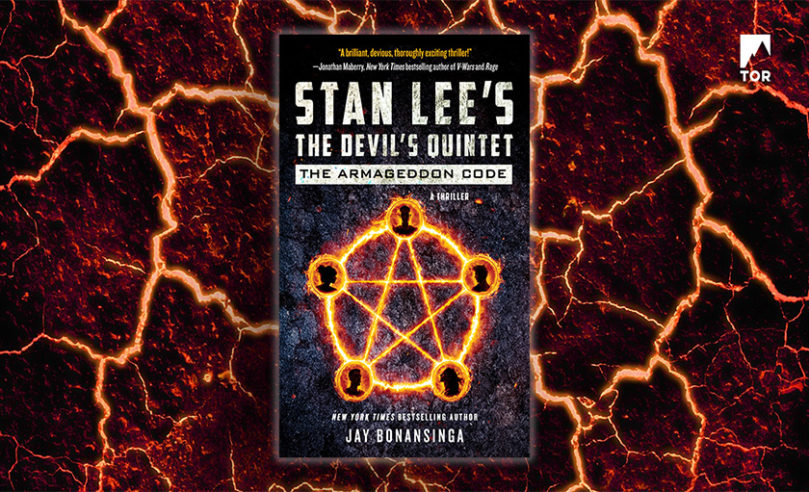opens in a new window opens in a new window
opens in a new window opens in a new window
opens in a new window opens in a new window
opens in a new window opens in a new window
opens in a new window
 In Stan Lee’s The Devil’s Quintet: The Armageddon Code, the world-famous architect of the Marvel Universe, teams up with New York Times bestselling author Jay Bonansinga to unleash a bold new superhero series on the world.
In Stan Lee’s The Devil’s Quintet: The Armageddon Code, the world-famous architect of the Marvel Universe, teams up with New York Times bestselling author Jay Bonansinga to unleash a bold new superhero series on the world.
A five-person special ops unit, composed of a diverse assortment of former Navy SEALS from all walks of life, are responding to a terrorist threat deep in the Caucasus Mountains when their mission goes south in a big way. Facing certain death and torture, they’re unexpectedly offered a Faustian bargain by the Devil himself, who grants them unearthly powers in order to send evildoers to Hell on his fiendish behalf.
But “The Devil’s Quintet” do things their own way, fighting to protect America and the world, while trying their best not to let their hellish new abilities corrupt them beyond redemption . . .
Please enjoy this free excerpt of opens in a new windowStan Lee’s The Devil’s Quintet: The Armageddon Code, on sale 01/25/2022.
CHAPTER ONE
Over Yonder at the Edge of Nothing
1.
The C- 5 Galaxy aircraft pitches and bumps over the jagged air currents above the vast, desolate surface of the Black Sea. The cabin smells of body odor and burning circuits as the leader of a small group of passengers braces himself against the jump seat, checking the luminous dial of his tactical chronograph. It’s now pushing 10:00 p.m. Moscow standard time.
Close enough for government work, the senior operative thinks as he surveys the dead grey slipstream outside the portholes. As far as the night sky is concerned, he could be anywhere. On a business trip over the Pacifi c. Approaching Hawaii for a long vacation. Hell, the aircraft could be fl ying over the little hardscrabble hamlet where he grew up. But his true destination— known only to the other four members of his team, a pair of pilots, and a couple of suits in the Defense Intelligence Agency— is a territory in the Tartarus Mountains between Armenia and Azerbaijan that currently holds the distinction of being the Most Dangerous Place in the World. Over yonder at the edge of nothing, the senior operative muses silently. He has a million of these colorful cornpone expressions that he picked up back in his childhood birthplace of Ducktown, Texas. (A QUACKING GOOD PLACE, the man remembers the town sign assuring passersby back in the day.)
A lean and weathered former jock clad in desert camo and body armor, the senior operative is somewhere in his fourth decade, his jarhead buzz cut just starting to streak with grey. Each and every deep line and crease around his icy blue eyes has been earned the hard way. In the fi eld of battle. Under fi re. Against the clock. Balancing life and death on a high- tension wire.
Many years earlier, back at Langley, the code name Spur had been conferred upon him during Specialist Training Camp. In those days intelligence operatives didn’t have a choice in the selection of their code names. But once in a while the instructors chose handles apropos of a particular subject’s skill set. The senior operative had a knack for motivating others, as in “Put the Spur to ’em, Paul!” The truth is, though, over the years the code name became the bane of his existence, an embarrassment, but that’s how code names work. They stick to you like a blemish that will never fade.
The man known as Spur feels the center of gravity shifting in the cabin as the aircraft banks over the craggy cliffs of the Balkan coastline. They begin to descend through an invisible chute of Georgian airspace, a sense of levitation tugging at the man’s gut. Military transports approach Camp H. S. Sherman near the northern border at a tremendous velocity for planes of this size—much faster than commercial airliners—due to the constant reports of antiaircraft guns along the Gehenna Highway.
Spur gnashes his teeth as the monstrous airship slams through the thickening atmosphere, pitching and yawing in the darkness. The voice next to him sounds all warbly, as though coming through a tissue of water.
“Racking up the air miles—eh, Spur? Got my eye on that Samsonite luggage.” The wisecracks emanate from the whip-smart Latina sitting across the cabin, also decked out in camo and battlerattle, her raven-black mane tucked under her headset. Her code name, Pin-Up, is an old-school reference to her traffic-stopping beauty. The moniker had been given to her when the SEAL team recruited her out of the Second Brigade Combat Team, Fourth Infantry, 358th Police Battalion. She had been a nurse in the 358th, and had gotten hit on more times than a punching bag at Gold’s Gym. In civilian life she’d been a working actress in L.A., had shot some national spots, done a few soap operas, but nothing of note.
Now she uses her striking good looks and chameleonlike acting skills to get into places off-limits to the rougher-hewn operatives.
In the intelligence services, code names can be jokey, they can be profane, or they can be cryptic. But on many levels, they are the coin of the realm in this shadowy world of black ops and government wet work, like private passwords for obscure computer applications. In fact, over the years it’s been unclear whether the code name grows on the person, or the person grows into the code name. There’s no denying the fact that the code names among Spur’s team have taken on a certain psychological resonance for each operative.
“Just do me a favor and stay frosty, Pin,” Spur says, and then surveys the length of the cabin. “That goes for all y’all.” He gives a terse nod to the other three agents hunkered along either side of this steel coffin they call a transport plane. Two other men and one other woman. Five operatives in all. All suited up and salty. Ready to rumble. Their HK418 assault rifles on safety, vertical, barrel down between their knees. Each loaded for bear with 5.56-millimeter NATO open-tip rounds. These weapons officially don’t exist. Nor do the specialists wielding them. Nor does this mission. “Spur” will file no paperwork, regardless of outcome. Loss-of-life-in-action carries the field acronym LOL, which is highly appropriate since death is merely a cruel joke to these five ghost soldiers.
The architect of today’s mission is the section chief of the Special Expeditionary Section of the United States Defense Intelligence Agency. All of which is why the mood in this hollow chamber of steel and nylon strapping has the businesslike feel of an operating room as the aircraft approaches the base. The cabin fills with metallic noises beneath the roar of the engines— snapping, zipping, locking.
Spur unbuckles himself and stands with his rifle slung tight across his chest. “Meter’s running, y’all,” he announces to the others, his big gnarled hands gripping the rail to steady him against the turbulence as the landing gear deploys with a muffled rumble. “On touchdown, I want eyeballs on the backgrounds. Gunners are stationed in the tower, trackin’ us with the escort. We got a lot of real estate to cross to get to that fucking bird. Airstrip’s been hairy in recent months. I want lips buttoned.” He shoots a look at a wiry African American man adjusting the chin strap on his headgear. “That means you, Ticker. Keep your mouth shut and your safety off.”
The agent in question makes a zipping motion across his mouth, knowing full well that the comment from Spur is drenched in good-natured sarcasm.
The operative code-named Ticker is a man of few words. The appellation was given to him by the training staff back at Dam Neck. The word has an esoteric origin. In those days, to “tick” meant to be hyperaware of the passage of time, as in “I still got half the SAT test to go, man, and I’m ticking like crazy now with only thirty minutes left on the clock.” The code name suited this handsome agent well whether he liked it or not. Mostly due to his razor-sharp intelligence. During his tenure at the training facility, he’d been hyperaware of everything—not only the hands of the clock.
Still is today.
In his midthirties with a finely trimmed goatee, Ticker holds the distinction of being the youngest Ph.D. to matriculate from MIT’s prestigious Applied Physics Program. He was bound for a tenured position at Oxford when his social-worker wife back in Chicago got herself killed in gang cross fire. Which changed everything for Ticker. In less than a year he was enrolled in the Naval Special Warfare Development Group. Training to be a SEAL. His near genius intellect combined with his relentless drive made him a prime candidate for Spur’s elite ghost unit.
The lurch of the landing gear making contact with the tarmac vibrates through the fuselage.
Spur’s voice drops an octave, gravely serious now. “It bears repeating!” he yells above the shriek of the engines as the C-5 settles into its rattling taxi across the scabrous runway. “Even though this is smash and stash—fast in, and fast out—we’re heading to the asshole of the universe. Always be cognizant of that fact.”
Each of the battle-ready agents gives him a nod. The aircraft comes to a jerking halt, electronic pings going off.
Everybody braces for Spur’s signal, unaware of the unpleasant surprise awaiting each of them. Spur nods at them. “Let’s go to work.”
2.
At first, everything seems routine. The base is quiet and still in its wee-hour doldrums. Quonset huts, like the frozen spines of dinosaurs, radiate outward from the central terminal. The deserted airstrip stretches past a luminous necklace of xenon landing lights. Planes are lined up along the inner lanes in mothballs. In the far distance, the rugged front range of the Tartarus Mountains scrapes the dark heavens, the snowcapped peaks like ghostly sentinels. The air hangs heavy with ice crystals and petrol fumes.
Following along behind Spur, moving in the Weaver position, his rifle’s back sight at eye level just as he was taught years ago in specialist training, the operative code-named Hack wants to let out his nervous energy with his typical barrage of Catskills smart talk. Born in Flatbush, New York, raised in Crown Heights, the only son of a middle-class Jewish couple, the man is matinee-idol handsome with a mop of dark curls, and preternaturally good with anything that has a keyboard, screen, or plug. Over the years he has proven there isn’t an embassy, bank, missile silo, or drone he can’t break into. But right now, he feels the tightness in his chest that he gets sometimes when things seem too good to be true.
He puts his head down and tries to drive the thoughts from his mind.
Approaching the edge of the tarmac, Spur halts and raises his right hand without even turning around. The others stop in their tracks, muzzles up. Spur’s fist clenches. Then an index finger points to the left, signaling to the others that they’ve reached the bird. Hack sees the dark tail section sticking out from behind a massive storage container. Just for an instant, out of the corner of his eye, Hack sees the smallest member of the unit shifting her gaze like a squirrel startled by a bus.
The diminutive Chinese woman code-named Boo could kill a man twice her size with her bare hands. In fact, her moniker— proffered upon her back at Fort Meade when she was training to be a counterintelligence agent—was a bad joke started by some smart-ass instructor. She was “Boo!” as in all things dark and scary, all things that go bump in the night, all things that get under your skin. Right now, though, something about her body language speaks volumes. She seems to be experiencing the same intuitive dread that has gotten under Hack’s skin.
Another silent hand gesture from Spur, and the single-file squad of specialists moves around the storage container and climbs on board the experimental Stealth Black Hawk—an aircraft whose very existence is classified and unknown to all but a small group of aeronautical engineers and functionaries at CIA headquarters back in Langley, Virginia.
3.
In the predawn murk along the southern border of Karakistan, only the shepherds and a few scattered groups of copper miners hear the low hum approaching on the wind. It sneaks up on them from the convolutions of glacial moraines and gorges cut like gaping wounds through the mountains. One of the older miners pauses, shining his torch heavenward at the ceiling of black clouds obscuring the stars. A wizened, bearded old sheepherder dressed in the traditional wool cape of the ancient Bedouins, he sees nothing but night sky.
Just for an instant, though, the old man feels a trickle of terror running down his spine, causing gooseflesh to break out along his leathery arms and legs. He has heard that sound before—that deep buzzing noise like an enormous insect scraping along the parched earth. It’s a message from God, a portent always followed by bloodshed or upheaval.
The old man shivers as a fountain of dust swirls up behind a dark berm a quarter kilometer away, whirling like a dervish, and then trailing after the specter of death for several moments before dwindling away to nothing.
4.
From inside the low-flying Stealth Black Hawk, Spur can see the pilot in front of him, a big man in yellow aviator glasses hunched over the stick, keeping the bird as steady as a chalk line as they hug the ground, skimming along at three hundred kilometers per hour. The onyx-black helo is one of only two prototypes currently in use among U.S. forces—outfitted with extra rotor blades in the tail, a modified Rolls-Royce engine with noisereduction technology, and exterior sound baffling to keep the craft as silent as a slight stirring of the wind.
Through the windshield Spur can see the shadow-bound landscape rushing under them like a black ocean. He estimates their current altitude at around fifteen meters, well under the radar, low enough to see the cracked pavement of derelict roads and battered directional signs printed in Arabic flashing past them in the predawn gloom.
“Hey, Cap,” Spur says to the pilot, raising his voice just slightly above the droning hiss of the blades. According to legend, the bird is so quiet that personnel on the ground can hear voices emanating from the sky as it passes. “Got an ETA yet?”
The broad-shouldered pilot nods at a GPS screen on his panel. A man in his late fifties with the face of a dour bloodhound, Captain Ed Deegan is a legend in Special Forces circles. Originally a field commander in the Seventy-Fifth Ranger Regiment, Airborne, he has kicked ass from Kosovo to the Sudan. “Ten klicks to go,” he says. “That’s if the intel’s to be believed. We’ll be there in three minutes. Give or take.”
Spur checks his watch. Should be plenty of darkness left to launch the incursion. Hopefully the warlord Osamir is still residing in his labyrinth of caves. These renegade hideouts are easily breached, porous as hell, with primitive security. Makes a smash-and-grab operation like this one, as Spur might say, as easy as pecan pie. As a matter of fact, Spur wants to be back at the base by midmorning with the intel gift-wrapped with some pretty blue paper and a pink ribbon for the brass. “Copy that,” Spur says to the pilot, and secures his rucksack for deployment. Inside the field bag are high-def cameras and portable copying gear. “Give us fifteen after dust-off,” Spur adds. “We ain’t back at the rendezvous point in twenty, send flowers.”
Deegan understands.
As the aircraft slows, and a deeper humming vibrates up the fuselage, Spur shoots a glance over his shoulder at his team. They’re crouched behind him, headsets and mikes framing their faces, night-vision goggles already on, rifles up high and ready. Best unit Spur’s ever commanded in the field. “Let’s shake ass out there,” he says to them. “No drama. Watch your backgrounds. Wait for the diversionary ordnance, and then get your butts in and out. Shouldn’t be more than a handful of guards. Each with a Russian AK. Take them down first, if necessary. Move, shoot, and communicate.” He looks at Hack. “Hack, you got the point.”
Hack nods, his goggles rattling. Then he says, “Not to belabor the point in any way, but in the likely event we meet up with the target, the rules of engagement are . . . what?”
“Shoot to wound. Get the intel, and get the Sam Hell out of there. Period. You copy?”
“Like a Xerox machine,” he says with that New York City twang.
The floor of the Black Hawk vibrates up through their bones, and the g-forces tug at them as the chopper banks around a steep slope in the darkness. Deegan finds a level patch on a ledge and lands the bird. The skids hit hard. Spur feels the impact in his molars as the backwash from rotor blades envelops the aircraft in white noise.
Spur yanks open the jump door, and the agents follow Hack into the night.
5.
The cold wind and sheep-shit stench greet Spur as he hops off the ledge and lands on a dusty shelf of rock. He secures his infrareds, switching them on and waiting for the green-tinted world to materialize in front of him. A second later he sees his team like chartreuse apparitions in front of him. Waiting for the signal. He gives it to them.
They hump up a steep slope of scrub without making a sound. Two abreast. The green world of boulder fields and subalpine vegetation swims on either side of Spur, the scrawny alder trees like skeletons. He recognizes the slope from intelligence briefings. The team reaches two thousand meters, and the first cave becomes visible, its dark maw of an entrance unguarded.
“Hold up! Hold your horses!” Spur whispers into his mike. The multiband radio is set to broadcast only to an elite audience of five. A few feet away, Ticker instantly stops digging in his pack for an incendiary device. The plan is to plant three explosive charges around the perimeter. When the commotion draws the guards out of the caves, the unit will then gain entrance and search for evidence of a nuclear weapons program. Human intelligence on the ground in Turkey and Pakistan has suggested that Abu Osamir’s terrorist network, known as the Shield of God, has gotten ahold of enriched uranium. But now the look on Spur’s face in the darkness makes everybody perk up. “Something ain’t smelling right,” he says very softly.
“Chief, at the risk of being a nudge,” Hack’s voice crackles, “can you elaborate on that?” The younger man crouches behind a boulder a few meters uptrail.
“Gimme a second. Keep an eyeball on the perimeter. Be right back.”
Spur creeps around a cluster of tangled alders, then scales a rocky buttress. He reaches the mouth of the cave and pauses with his back against the edge of the opening. He raises his rifle. Points the muzzle. And then quickly moves in front of the entrance.
His chest tightens with alarm as he scans the shadowy interior of the cave. He switches on a flashlight. Nothing but strapping tape, empty wrappers, and damp cardboard boxes litter the dirt floor that reaches at least a city block into the depths of the former copper mine. A few discarded blankets and cans of butane suggest it was once inhabited, but apparently that was awhile ago. Spur lets out an agonizing breath.
“Chief?”
Hack and Ticker stand in front of the cave. Guns poised. Ready positions. “I’m no expert, but you might want to come out here.” Hack sounds grave all of a sudden. “There’s something out here you maybe want to go ahead and take a look at.”
Spur emerges from the cave and follows the men across a narrow clearing. They find Pin-Up perched on a petrified limb about three meters above the ground. She holds a pair of binoculars to her eyes, scanning the horizon. She sees something that makes her suck in her cheeks as though she’s tasting something sour. Boo stands below her, shaking her head, murmuring something in Mandarin. Dawn is just starting to lighten the edges of the horizon, turning the sky a luminous purple and casting an otherworldly glow on the landscape.
“What is it?” Spur wants to know.
Pin-Up climbs down, and hands over the binoculars. “Make sure you take an antacid before you look.”
Spur climbs up, removes his goggles, and takes a peek through the twin lenses.
His throat goes so dry he can hardly swallow. He’s barely aware of his own voice as he murmurs, “Well, butter my ass and call me a biscuit.”
CHAPTER TWO
The Center Collapsing
1.
Decades of intel on Abu Osamir paint a picture that could be hung in a gallery of third- world archetypes. Born in abject poverty in Karakistan, the son of a sheepherder, Osamir grew up in the mountain village of Tiblisia. Situated on a craggy shelf of granite, the town had the distinction in the 1960s of being smack- dab in the middle of a burgeoning ground war between the Communists and the Council of Seven Tribes.
For nearly twenty years, the Russians pounded the slender, crescent- shaped nation to no avail. The primitive people of the mountainous borderland along western Azerbaijan banded together with nothing but rusty Israeli rocket launchers, American dollars, and simmering rage to beat back the invasion. And no one profited more from the conflict than the young Abu Osamir. The stocky bulldog of a teenager traded goods with both sides, served as a drug mule between the poppy growers and mercenaries from the West, and began to build a coalition of opportunists with no allegiance to anyone or anything other than their own wallets.
By the time Osamir reached his early thirties, he was the undisputed kingpin of the Karakistani underworld . . . as well as the most brutal of all warlords in the Tartarus region, periodically showing up on the NSA’s nuclear arms watch.
Shadowy images from intelligence reports and the rare appearance of Osamir online reveal a squat, thick-necked bison of a man who favors revolutionary garb that would make Che Guevara blush with embarrassment. Berets and bullion fringe and riding boots and silver-plated sidearms are Osamir’s trademark fashion statement, and torture the canvas upon which he paints in the blood of his enemies.
In fact, up until today, at this very moment— as Spur peers through the fi eld glasses from his craggy perch— it had seemed that the only things left wanting in Osamir’s orbit were secret hideouts in bad need of makeovers. For years, classified satellite photos revealed festering caves, tin- roofed shacks, and rubble-strewn outposts that served as the meager, ever-shifting headquarters of Osamir’s operations. Now gaping through the narrow field of vision of the binoculars, Spur has difficulty believing what he’s seeing.
Three kilometers away, in a natural amphitheater of stone, a miracle of modern architecture and armament rises up in the magenta predawn glow. Part Gothic fortress, part Mies van der Rohe skyscraper, part Walt Disney house of horror, the building resembles a high-tech spaceship that has landed in the crevices of the ancient mountain range. Soaring steel-framed guard towers flank the curvilinear walls of the structure, each tower equipped with ranks of massive M240 machine guns. Gigantic mortar launchers and immense satellite dishes sprout from the dome-like roof. A cat’s cradle of thin red laser beams crisscrosses the ground level, suturing through dust clouds, giving the edifice an impenetrable feeling of “Fort Knox meets the Pentagon.”
“Not since I toured Graceland have I seen such a McMansion.” Hack’s hushed voice crackles in Spur’s earpiece, taut with tension. “What do you make of this, Spur?”
Spur swallows hard, and then whispers into his mike, “Looks like old Abu’s gone and spent some of his rainy-day money.”
2.
At this point, Spur reverts to his training, his gaze shifting around the general vicinity of the rocky shelf on which he currently crouches, his skin prickling with adrenaline. Take your time, cowboy, the instinctual voice in his head tells him. Don’t run to your death. He looks through the goggles, glancing over his shoulder. The sun is coming up, turning the green hue of his infrareds as hot as molten lava. He knows whenever an unexpected variable arises to first assess his position, as well as the position of his team.
He sees Hack’s skinny ass five meters away, dead ahead, gaping at the fortress like a hound dog on the scent. He sees two other team members—Boo and Pin—up on a ledge to his left, side by side, as still as deer in the dusky light.
“This sure as hell wasn’t in the brochure.” This new voice belongs to Ticker, his customary witticisms now stretched thin with nerves. “NSA satellite on the fritz again? Anybody ever heard of Google Earth?”
Spur rips off his goggles, and sees the slender African American down on his belly to the immediate right, five meters away on a precipice, squinting through his own binoculars. The first rays of early sunlight glint off the face of his watch—a dead giveaway. “Ticker, listen up,” Spur whispers into his mike. “Turn your watch around. Watch your metallics. Stand by for a second. Just stand by.”
“Boss?” Pin’s voice this time, accented slightly with its West Coast Latina spice. “Boss, are you hearing—?”
“I said stand by, Pin!” Spur hisses into the mouthpiece. He hears something. Actually he feels it more than hears it: a faint vibration up through his bones, intensifying with each passing second. Is it coming from behind them?
“Boss—?” Boo’s voice pipes in through the earpiece.
“Goddamn it, I said stand by. Everybody! Just stand the fuck by!”
Ticker’s voice chimes in then. “We got company, Spur, three o’clock.”
At the same time Spur hears the sizzle of Ticker’s warning in his ear, he sees a whirlwind of dust rising behind them, the vibration intensifying, the rumble of engines. Spur’s throat tightens. “Everybody, prepare for evasive!”
Almost simultaneously, from three directions, the vehicles and personnel come into view on thunderheads of dust.
It happens so quickly Spur can barely react. From the east a pair of armored Bradleys roar toward them with .50-caliber guns on the ass ends, their tank treads raising a fogbank of thick haze. From the west, snaking down a mountain road, three jeeps filled with gunmen converge. And from behind them, topping the rise, comes a battery of men on ATVs—at least a half dozen of them—aiming machine pistols as they approach.
A silent voice shrieks in Spur’s brain: Ambush . . . it’s a fucking ambush!
He leaps to his feet, and is about to call an audible—sending his people down the slopes in opposite directions in a classic evasive maneuver, tossing diversionary blasts at the perimeter, meeting up later at the safe house—when he sees the magnesium flash out of the corner of his eye and hears the sonic boom one second later. The sound emanates from the rooftop of the fortress. The comet trail of a mortar arcs out over the gorge—
and then the air erupts and everything—everything in the playbook—instantly changes.
3.
The massive explosion chews a house-sized crater from the side of the mountain twenty-five meters from the team’s position, whiplashing Spur and the rest of them backward on the shock wave.
Spur lands in a shower of gravel, the breath momentarily knocked out of him.
He turns over in the brown wind drift of debris, gasping for air, reaching up to his mike . . . a robotic singsong refrain slamming through his consciousness . . . save the team, save the team, save them, save them. . . . save them to fight another day. “Stand down!” he booms into his mouthpiece. “Everybody! W-weapons down! Hands visible where all can see!! Do it! Do it now!”
He rolls over. Painfully rising to his knees, he makes a big show out of throwing down his weapons and raising his gloved hands in the international symbol of unarmed please don’t shoot.
Through the haze he can see the heavy vehicles circling, spiraling closer and closer, countless muzzles staring at him like dead black eyes floating in the dust-fog.
Then he sees a commotion fifteen feet away in the rubble, and his heart sinks.
4.
Boo squirms in the dirt while Hack tries to prize something from her mouth, his fingers frantically probing so deep in her throat that she gags and convulses on the ground as though stroking out. In any other context, it might look comical: a big brother trying to rescue the last malted-milk ball from the gullet of his obnoxious little sister.
But Spur knows exactly what’s going on and it makes his gut clench: How the hell does a mission go so far south so quickly?
Boo grew up in the Hubei Province of China, the daughter of diplomats and politicians. She lived in a beautiful area along the Yangtze River, long regarded as the home of the celebrated ancient Chinese poet and minister Qu Yuan. Legend has it that Qu Yuan, after a distinguished career in public life, took his own life by walking into the Yangtze while holding a rock. The suicide became a deeply ingrained part of Chinese culture, the act itself considered by many as a way to protect one’s innocence and life principles.
Was this the reason Boo reached for that white capsule hidden in the lining of her flak vest? Each and every member of the team has one. Each of them knows its purpose. Slip it in your mouth, bite down, and the bitter taste of the botulinum toxin will be the last sensation you will experience on this earth. The body goes into an immediate paralysis—the brain keeping secrets and battle strategies safe in its vegetative state—until you ultimately bleed out all over your enemy’s fine parquet floor.
Hack finally gets his thumb and forefinger around the capsule before Boo has a chance to chow down on it. He plucks it from the depths of her craw and throws it across the smoking crater. Then he lays his forehead on hers.
She pushes him away, her face a mask of anger and humiliation.
For just an instant, watching this, Spur’s mind swims with contrary emotions and imponderable questions. He wonders if the workplace affair between Hack and Boo has not completely dwindled. He had to step in last year in Libya in order to put the kibosh on it. Romantic entanglements can get team members killed. All of which is why his own flirtation, with Pin-Up, is a luxury he can’t afford.
In that scintilla of a second, as his mind grapples for a way out of this trap, Spur glances across the ridge and sees Pin-Up on the ground, under the petrified tree, as still as a mannequin. The sight of her in jeopardy makes the secret place in Spur’s heart pang with equal parts longing and dread, all of which sets off a series of quick memory flashes . . .
. . . that surreal night in a tent outside Khartoum, Spur alone with Pin-Up . . . the two of them fresh from a successful mission, adrenaline still running high, and liquor flowing freely . . . their faces coming together in strobe-light sparks of heat lightning . . . their drunken kisses awkward and sweaty and desperate . . . their common desire like that of a couple of parched nomads returning from the desert, furiously gulping each other’s essence . . . and then . . . then . . . pulling back . . . knowing they are about to commit the Warriors’ Cardinal Sin.
The roar of engines drowns his thoughts, the cry of voices in Arabic juicing his adrenaline. The team members have their hands up now. Faces grim. Trapped. Caged animals coiled for a fight.
The first thug to arrive is an older man standing on the passenger side of a rust-pocked Humvee, swarthy like a pirate, his face obscured by the brim-shadow of his camouflaged cap. The morning sun has reached a point of severe angles, blazing in Spur’s face, blinding him, making him blink.
“Qaf!—Qaf!—Alan!—Alan!!” the pirate leader bellows at the top of his lungs in Arabic, aiming his Russian assault rifle. “Tawaquf ’aw mitu!—Tawaquf ’aw mitu!!”
Pin-Up comments under her breath: “I believe he’s saying, ‘Welcome to Karakistan, brave Americans, and thank you for your service.’”
“LA!-TATA!-KALM!—LA!-TATA!-KALM!” the pirate calls out as he hops off the running board and approaches with the muzzle up and ready.
The rest of the ambush closes in on all sides, making a thunderous racket and raising a dust cloud the size of the Hindenburg. More thugs hop out and approach. They’re well-armed, apparently as well-funded as their Astrodome of a stronghold. One of these newcomers—a younger man with a dark ponytail hanging out the back of his cap—cries out in heavily Eastern European– accented English, “Hands behind your heads! Now! Now!!”
Not a single member of Spur’s ghost unit averts their gaze as they calmly interlace their hands behind their necks. A gangly assistant in a shemagh scarf hops off the back of a Humvee and shackles each member with a zip tie. Throughout the process, each prisoner stares at Ponytail with the stoic patience of a person waiting for a light to change so they can cross the street.
At last, the operative code-named Spur gives Ponytail a cold smile, and then says in his bourbon-soaked drawl, “Your move, hotshot.”
Copyright © 2022 by Stan Lee and Jay Bonansinga
Pre-order Stan Lee’s The Devil’s Quintet: The Armageddon Code Here:
opens in a new window opens in a new window
opens in a new window opens in a new window
opens in a new window opens in a new window
opens in a new window opens in a new window
opens in a new window






